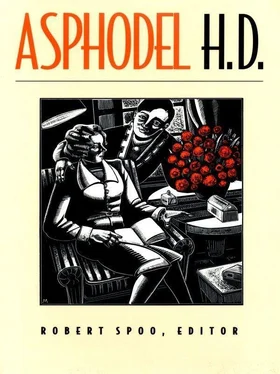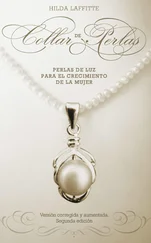18. William Carlos Williams also noted the interdependence of love, death, and the imagination in his late poem “Asphodel, That Greeny Flower.”
19. H.D.’s composition process typically began with rough pencil drafts in notebooks, followed by her own typed draft of the material she had written. She then had her typist prepare a fair copy. The typescript of Asphodel may be the work of her typist.
20. Two small exceptions should be noted. The typescript of Asphodel contains two versions of page 147 of part 1; both are carbon copies on identical typing paper, one page containing a sentence which the other omits. I have retained the sentence. Also, a short selection from chapter 15 of part 1 was published in an appendix to Ezra Pound and Margaret Cravens: A Tragic Friendship, 1910–1912 , ed. Omar Pound and Robert Spoo (Durham, NC: Duke University Press, 1988). I have taken this published excerpt into account and have departed from its text (which I also edited) in a few minor readings.
21. H.D. to Marianne Moore, January 19, 1952, unpublished letter, Marianne Moore Papers, V:23:33, Rosenbach Museum and Library, Philadelphia.
22. Late in life, at the urging of Norman Holmes Pearson, H.D. went through her published and unpublished writings and attempted to regularize comma usage and other accidentals, though at times she found the task uncongenial and left it to Pearson. I have decided not to impose this late practice on a work H.D. produced in the 1920s, when her creative assumptions and attitudes toward publishing were different.
23. Readers may wish to compare this edition of Asphodel with the text of the first four chapters of Paint It To-Day , edited by Susan Stanford Friedman and Rachel Blau DuPlessis and published in Contemporary Literature 27(1986): 440–74. With some slight differences, they implicitly make the same distinction I have made between H.D.’s orthography and her punctuation.
24. A comprehensive list of significant editorial changes to the Asphodel typescript will be published in the H.D. Newsletter , ed. Eileen Gregory (Dallas Institute of Humanities and Culture).
“There are no fields of asphodel this side of the grave.”
W. S. Landor
France. France swirled under her feet for now that the boat was static it seemed, inappositely, that the earth must roll, revolve and whirl. Hermione clutched the railings of the stairs and the broad flight of stairs leading upstairs whirled and turned with her as the narrow cabin step ladder of steps leading down into the sordid ship’s belly had never, it appeared, even in its worst days, done. The memories of sea storm were pacific compared with this thing: stairs that inappositely whirled under her and a bed that when she flung herself upon it, heaved and swayed under her, heaving and swaying and swaying with the heave and sway of faded rose buds in loops that was the almost effaced but still reliable pattern of the salmon-coloured paper of the wall she stared at. Stairs in her imagination heaved and sank under her. She seemed about to float away, lax, bodiless.
“There is nothing wrong with you.” Madame Dupont, their boat acquaintance, had stayed with them, had the room down the corridor one remove from the rooms of Hermione and the two Rabbs. “There is nothing wrong with you.” Hermione managed to heave aloft on one elbow and by a determined and valiant effort keep the bed steady under her elbow while she listened. “There is nothing wrong with you.” A dark figure stood in the doorway. It drew nearer. It was clothed like a sister of charity in black, it had a black hat pulled over its eyes, the very hat they had all so bargained over this morning, shopping in Havre with Madame Dupont. Madame Dupont, had insisted on it. “My sister and my brother-in-law will be so shocked to see me back from New York without the proper black things. I didn’t get them in New York as they are so expensive.” Madame Dupont had arranged her mourning to suit her purse and her convenience. Was it French simply? Putting on black when she got to Havre, saving her best black, not wearing black on the boat. This mourning de convenance seemed suddenly to Hermione inconsolably amusing. She would begin to laugh and laugh and laugh. She would never be consoled. Imaginez vous, buying the things in Havre where it was cheaper. . cheaper for someone you cared for, but Madame Dupont hadn’t even cared for her mother. Said so. Told them frankly “you see. . he was a very old man. But even that. . in France. . But you see. .” and she had whispered the tale of her dot -less marriage with a rich old man who had (whispers) and her mother knew it. French. France already on the boat had come true. . just that horrible story, true . Things happened out of de Maupassant, any de Maupassant story might come true, Boule de Suife, fat pretty cocotte in the railway carriage going to bed with the Parisian officer (Bouile de Souife was it?) and then everyone cutting her afterwards. . that was France, de Maupassant was true. Literature was true. If de Maupassant was true then life and letters met, were not sub-divided, hermetically shut apart. Helen thy beauty is to me was still hermetically sealed and a star, but de Maupassant in one terrible instant became real, a reality. Terrible and strong. They said it was Flaubert’s illegitimate child. Writing. How marvellous. Writing. She must write. Hermione must write. She must write this: salmon-coloured wall paper. . faded; elegant Louis Seize gilt clock (on the elegantly empty mantel piece) that doesn’t go; standing in the door-way a grotesque figure, stiffly erect, in the correct posture of her new cheap mourning, Madame Dupont saying, “but there is nothing wrong with you.”
Hermione’s elbow kept the bed quiet for a moment. The bed for a moment, was forced, by her effort, to rest firm and four-footed on the floor. “But Madame Dupont, I never said there was.” “No, Madame Rabb tells me. You think you are suffering from the effects of the boat. You are not.” “I don’t think anything—” “Don’t interrupt. You think, owing to erroneous impressions, that you, having kept well on the ship, are now ill. The people who thought they were ill on the ship are now well. Is this some sort of punishment for my arrogance, you may well think. But you need not. God in his goodness will eradicate this error from your mind—” O God, Hermione would begin to laugh and laugh and laugh. Her elbow could not now keep the bed from wobbling. The bed itself capered on one foot, on three feet, up — down— “O, O, thank you.” If she had known Madame Dupont was a Christian Scientist she would not have wasted Eau de Cologne on her on the boat. If she had so known. Should Hermione remind Madame Dupont of those sunny, dazzling, sick sterile days when everyone said that they would so much rather the boat went down? Or those terrible intense days of baffling salt-whipped storm when there was no one to talk to and only she and Fayne Rabb had survived the mêlée? She had not then said to Madame Dupont “you are not sea-sick” though Madame Dupont kept on now insisting “you are not land-sick. There is, I assure you, nothing wrong. Mrs. Rabb, who persists in error, says you had better rest here. We are going out for lunch. But I persist in this. You will be all right for dinner.”
“Brrrr sous la livre — Brrrr sous la livre” went on and on and on. A raucous voice persisted that something was some number of sous (brrrrring over it) the livre and what was a livre anyhow. Livre, livre. A book. A book. It was all a book. They had wandered out of a world into a book. They were dream people and they were wandering in the pages of a book. They were like black flies and they crawled across the print. . no, it was not print, it was a hard cobbled street winding a little and leading to a shrine. The street climbed the hill and the cobbles hurt the thin soles of Hermione’s still sea-worthless feet. Climbing the street toward a door — a cathedral was it — the voice going on and on making long echoes like some voice “off” in some obvious stage set. The scenery was worn out, obvious. This was never true, could never have been. Livre. “But a livre is a book isn’t it? What is a livre anyhow? Where is that hateful old Dupont creature? She might make herself useful for once. But what a mercy anyhow she’s left.” She was gone, for the nonce (shopping again?) Madame Dupont, cheap mourning and another half-mourning hat (still cheaper) with a spray of artificial half-mourning wheat sheaves on it. They had themselves bought hats, Hermione and the two Rabbs, were now wearing them, Fayne and her mother, Clara they now called her, Clara Rabb and Fayne Rabb and Hermione had bought hats, wonderful hats, soft about their faces, without linings, not so expensive — sans doublure — no, the bigger one. Madame Dupont had helped them, helped them buy exquisite wide straw hats for something about three francs, very extravagant Madame Dupont had said, harrowing the dumpy little milliner’s assistant who might have been Boule de Souife come to life only she had such odd tobacco coloured eyes such white skin, somehow dumpy but with white skin like a magnolia. A common girl in a little back-water of a shop, draper’s assistant and the masts of the boats showing through the uneven squares of the narrow window over the counters of cheap calico and bunches of artificial cherries and plum and magenta ribbons. Boule de Souife. Hermione had whispered “Boule de Souife” and Madame Dupont had dropped the bunch of magenta bignonias she had almost bought instead of the half mourning wheat sheaves to exclaim, “what, but Mademoiselle, you don’t know what you’re saying.” “I wasn’t saying anything. Only remembering—” “You picked up strange ideas in your French studies. You seem to have been oddly coached.” Coached. Where had she got that word? Her husband the new American-French one, had learnt his English in Oxford. Coached. “You mean — taught?” “Taught. Yes. What did I say?” “I don’t know — please don’t be upset, Madame Dupont. It’s France simply.” “I can’t see that there’s anything for you to get upset about in France. You have your good home and your good parents to return to.” Why must she so spoil everything? Black beetle, frog, horrible black beetle French-American frog, getting the best you can out of everyone, out of every country. Sending me back or wanting to. “Can’t you see, frog, black beetle” Hermione almost shouted at her “that I adore your country?” Country. Country. Boats bumped up narrow salt canals and there were women in little flower bonnets, white wings to their bonnets like gull wings. Bretons, Madame Dupont told them.
Читать дальше












